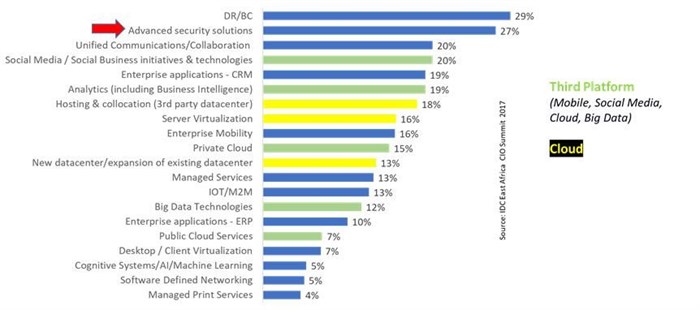
Top stories






More news















At the core of digital transformation is what IDC calls the third platform which comprises four pillars; cloud, big data/analytics, social media, and mobility, with all these allowing enterprises to digitally transform in various areas such as new customer contact channels, product innovation, market segmentation among other areas.

Further, these four pillars support various innovation accelerators that include; NextGen security, IoT, AR/VR. Cognitive systems, robotics, and 3D printing.
However, there are various challenges organisations currently face when thinking about digital transformation which includes; skills, silos, defining roadmaps in an environment that is ever-changing while trying to keep up with daily business pressures and defining what KPIs best show how DX is delivering business objectives.
The total sub-Saharan ICT Market is expected to grow from $95.4bn in 2020 to reach $104.2bn by 2023, a CAGR of 4.5% for that period. Out of this, South African spending will grow from $29.3bn in 2020 to reach $33bn by 2023 while Nigeria will grow from $10bn to $11.3bn in the same period. Kenya’s ICT market will grow from $4.4bn to $4.8bn for the same period.
According to IDC’s Sub-Saharan Africa CIO Survey 2019, third platform technologies (cloud, big data, mobility, and social media – see chart below) are among key investment priority areas for 2020 and, in the periphery are other technology investment that support the third platform or innovation accelerators including disaster response/business continuity, advanced security, enterprise applications, analytics and hosting.

Among the emerging areas of DX in SSA include the following:
4 pillars for DX success in Africa
Over the last 20 years many new technologies have been implemented in the African region – some with resounding success – think the mPesa payment platform, while others have floundered and died. IDC has noted four common success factors that are not negotiable in the region - we call this the RASA filter.
Relevance
The African region has unique operating environment characteristics ranging from diverse consumer preferences to specific line of business expectations.
If a solution is promoted purely based on technological attributes such as speeds and feeds and ignores the direct impact that the application of the solution will have on the ultimate user, then it is bound to stutter. The relevance of the solution must map exactly to a business outcome such as increased customer satisfaction, higher production output, or improved sales volumes.
The question to ask is “How does this solution immeasurably improve what aspect of the business?”
Affordability
Cost is an inevitable aspect of any technology implementation and more so in the African context. Local currency values fluctuate wildly and buying power versus stable international currencies is typically weak while pricing is denominated in these currencies.
In many cases, the technology is desired and will make a significant impact on the business yet is not affordable when measured against returns expected.
Security
As the variety and complexity of technology increases so too do the security threat surface available for malicious exploitation. Africa is well connected to the global ecosystem in terms of finance, banking and commerce so cyber and physical security threats originating internationally and, more importantly, locally, must be considered whenever a new technology is implemented.
Accessibility
While much has been made of the significant improvements in global connectivity via undersea and satellite communications around Africa in the last 10 years there are notable gaps in terrestrial access across the continent, especially in rural and semi-rural areas.
Affordable connectivity via reliable, high-speed fibre is typically limited to urban or metropolitan areas while rural connectivity remains expensive and inconsistent.
IDC suggests that by applying these four, simple common-sense filters at the outset of any digital transformation project much frustration is prevented and will help African CIOs and IT strategists to identify and overcome challenges before they occur.